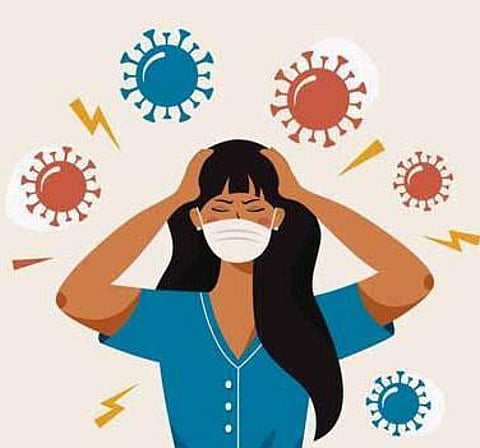

KOCHI: With the second wave bringing about all over the country, reports of health problems among recovered patients are also increasing. Physical and psychological symptoms seem to be more pronounced among the elderly and those with significant lifestyle diseases. Health problems that persist for four weeks or more after testing negative are recorded as ‘post-Covid health problems. These symptoms may be severe even in those people who were symptomatic.
Long Covid
A group of symptoms that persist several months after a person has contracted Covid are referred to as a long-Covid syndrome. The common manifestations include extreme physical fatigue and tiredness, difficulty in thinking and concentrating, intractable headache, inability to identify taste and smell, giddiness while standing or walking, chest discomfort and palpitation, heartburn and regurgitation, breathlessness, severe pain in muscles and joints, intermittent fever, sadness and intense anxiety, and chronic cough. Most of these symptoms worsen with physical or mental strain.
Post-Covid mental stress
A recent research article published in the internationally renowned medical journal “Lancet”, says that 34 per cent of the people who recovered from Covid suffer from psychological disorders warranting clinical attention in the next six months. Of this, 17 percent reports anxiety disorders, 15 per cent mood disorders like depression, 7 per cent are in danger due to substance abuse disorders and 5 percent suffer from chronic sleeplessness. Many of these people also show suicidal tendency if the condition is not identified and treated immediately.
Psychosomatic disorders on the rise
A large percentage of people who have recovered from Covid also suffer from various psychosomatic disorders, which are essentially physical disorders worsened by stress. The commonest among them happens to be gastroesophageal reflux disease (GERD) characterised by acid reflux, heartburn, upper abdominal pain and indigestion. Sometimes, these can progress to peptic ulcers in the stomach or intestine leading to difficulty in eating and consequent weight loss.
Some of the recovered patients had diabetes mellitus and a handful had increased blood pressure. Many people who had pre-existing diabetes and hypertension while contracting Covid found their condition has worsened post-recovery. A large number of recovered persons, especially the elderly, had severe bone and joint pain incapacitating them from pursuing their day to day activities.
Covid is a systemic illness that affects all internal organs. It can cause blood clotting in vessels, leading to heart attack or even stroke. The Lancet study shows that 2.1 per cent of recovered persons had an ischaemic stroke due to blood clot in cerebral blood vessels while 0.6 per cent had bleeding in the brain and another 0.7 per cent had cognitive dysfunction similar to dementia. There have been many reports of recovered patients suddenly falling and dying. The author is a Consultant Psychiatrist at Government Medical College, Thiruvananthapuram
WHAT IS THE SOLUTION?
Continue to rest for a few days after recovery and follow lifestyle modifications suggested by health professionals meticulously. This will help boost health and effectively return to the normal spectrum of activities at the earliest. Some general instructions to be followed during this phase include
Drink plenty of warm water, preferably a glass per hour to prevent dehydration.
Eat only warm food and fluids
Avoid old and refrigerated food materials including ice cream and soft drinks
Ensure at least 8 hours of sleep daily. Practice sleep hygiene techniques to ensure it
Practice relaxation exercises like deep breathing in the morning and night to reduce stress and keep the mind calm.
Avoid strenuous physical and mental activities for a few days
Expose yourself to sunlight for half an hour in the morning and evening to ensure adequate Vitamin D in the body, which apart from strengthening bones and muscles, will also increase your immunity.
Start practising mild physical exercises as per the instructions of the doctor.
If you feel severely stressed, depressed or sleep-deprived for several days or feel suicidal, get the help of mental health professional.
Connect with friends and relatives over the phone or social media and exchange pleasant thoughts and ideas with them
Avoid fake news and reports on Covid. This will feed your anxiety and worsen your mental health
Spend at least an hour daily on your hobbies. Keep the mind alive and positive